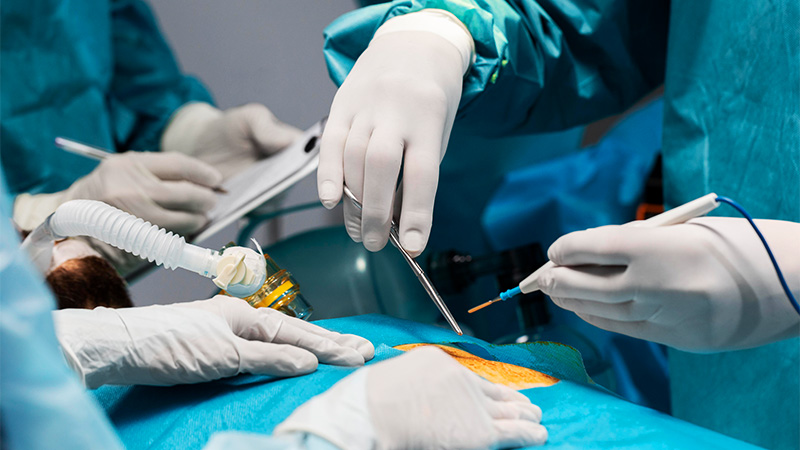Overview
Pediatric surgery is a specialized field of medicine dedicated to the surgical care of infants, children, and adolescents. Unlike adult surgery, pediatric surgical procedures address the unique anatomical and physiological considerations of young patients, taking into account their ongoing growth and development. Our pediatric surgeons at Parvathy hospital diagnose, treat, and manage a wide range of congenital and acquired conditions that affect children carefully and cautiously.
Common Paediatric Surgical Conditions
Pediatric surgeons address a broad spectrum of surgical conditions in children, including but not limited to:
- Congenital Anomalies: Birth defects that may involve the gastrointestinal tract, heart, urinary system, or other organs, requiring surgical correction.
- Pediatric Trauma: Injuries resulting from accidents, falls, or sports-related incidents that may require surgical intervention to ensure optimal recovery.
- Neonatal Surgery: Surgical procedures performed on newborns to address congenital issues or conditions that become apparent shortly after birth.
- Pediatric Tumors: Surgical removal of tumors, both benign and malignant, in children, often requiring a multidisciplinary approach in collaboration with oncologists.
- Gastrointestinal Disorders: Surgeries for conditions such as appendicitis, pyloric stenosis, hernias, and inflammatory bowel disease in children.
- Urological Procedures: Surgical interventions for congenital anomalies, kidney issues, or urinary tract disorders in pediatric patients.
Treatment and Care
Pediatric surgery involves a comprehensive approach to surgical interventions in children, ensuring specialized care and attention to the unique needs of young patients.
Treatment and care may include:
Treatment and care may include:
- Preoperative Evaluation: Conducting thorough assessments and evaluations to determine the necessity and feasibility of surgery.
- Surgical Procedures: Performing a range of surgical interventions using the most appropriate and least invasive techniques whenever possible.
- Postoperative Care: Providing specialized care in the postoperative period to monitor recovery, manage pain, and prevent complications.
- Family-Centered Care: Engaging families in the care process, offering support, education, and guidance throughout the surgical journey.
- Pediatric Intensive Care: Managing the care of children who require intensive care following complex surgical procedures.
- Minimally Invasive Surgery: Utilizing advanced techniques such as laparoscopy or endoscopy to minimize surgical impact and promote faster recovery.
- Reconstructive Surgery: Performing procedures to restore form and function, particularly in cases of congenital anomalies or trauma.
- Counseling and Support: Offering emotional support and counseling to both parents and patients before, during, and after surgery.
When to Consult a Doctor ?
It is advisable to consult a Pediatric surgeon at Parvathy Hospital, when:
- Your child has a congenital anomaly that requires surgical correction.
- Your child experiences a traumatic injury that may necessitate surgical intervention.
- Your child is diagnosed with a surgical condition, such as appendicitis, hernia, or a tumor.
- Your child requires elective surgery for a condition affecting organs or structures in the body.
- Your child needs specialized surgical care as part of a comprehensive treatment plan.
Call +91 98412 98412 for medical emergencies or 044 2238 2248 / +91 98848 99091 to book an appointment.
General (FAQ) For Pediatric surgery
A congenital anomaly is a structural or functional abnormality present at birth, resulting from factors during fetal development.
There are numerous congenital abnormalities, including heart defects, neural tube defects, cleft lip and palate, Down syndrome, and others. The specific list can vary.
An example of a congenital condition is a heart defect that a baby is born with, impacting the normal structure or function of the heart.
Pediatric trauma refers to physical injuries or wounds experienced by children, often due to accidents, falls, or other traumatic events.
Common types of pediatric trauma include fractures, head injuries, burns, abdominal injuries, and soft tissue injuries.
Neonatal surgery involves surgical procedures performed on newborns or infants, typically addressing congenital anomalies or other medical conditions.
Common pediatric surgeries include appendectomy, tonsillectomy, hernia repair, cleft lip and palate repair, and orthopedic procedures like fracture repair.
Common pediatric tumors include neuroblastoma, Wilms tumor, leukemia, brain tumors, and osteosarcoma, among others.
Common gastrointestinal diseases in children include gastroenteritis, inflammatory bowel disease (IBD), celiac disease, constipation, and gastroesophageal reflux disease (GERD).
Treatment for gastrointestinal diseases in children may involve medications, dietary changes, lifestyle modifications, and, in some cases, surgical interventions.
Urological procedures involve surgeries or interventions related to the urinary tract and male reproductive system, addressing conditions like kidney stones, urinary incontinence, and congenital abnormalities.
















